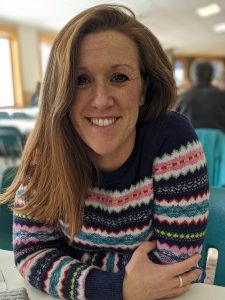By: Dr. Britnie Delinger Kane, Assistant Professor at the Citadel
In education, inquiry has long been considered foundational to all four major disciplines (e.g., Dewey, 1927)—English, social studies, science, and math—and it has been motivated and defended from a number of theoretical backdrops (i.e., critical literacy; social constructivist theories of learning; disciplinary literacy; engagement theory; and on and on). Others might choose a different conceptual framework from which to understand the place of inquiry in classrooms, but—for my money—I prefer to understand its utility from the standpoint of social constructivist theories of learning. This stance helps us to see connections between inquiry-oriented instruction, disciplinary literacy, and even more equitable forms of instruction.

The term “constructivist” teaching is often bandied about, but it’s a deeply complex and potentially misleading term. If you have never read Marc Windschitl’s (2002) review of the research on “constructivist” or “student-centered” instruction, you should. It will change the way you think about every piece of educational research you happen across —not to mention every blog with ten tips for integrating into the classroom Chromebooks or SeeSaw or Lucy Calkins’s writing curricula. Windschitl’s main argument in that piece is that the field has been unfair to teachers in advocating for a nebulous idea of “constructivist” teaching. He then, in detailed and clear ways, distinguishes between two broad orientations to theories of learning, cognitive constructivism (think Piaget) and social constructivism (Vygotsky), which continue to inform thinking in the learning sciences.
So far, many of you may be nodding, straining to remember that Ed Psych class long ago where you kept getting the words assimilation and accommodation mixed up and someone asked you to make a poster about Vygotsky’s ZPD (only rarely have I been in a School of Ed that wasn’t plastered with posters of the ZPD). The point that Windschitl (2002) highlights is that humanity can file the articulation of coherent theories about human learning on its list of invaluable accomplishments of the last 100 years. However—and this is the clincher—theories of learning are NOT theories of teaching: Just because we know boatloads more about the ways that people learn does not necessarily mean that we can fill the same boats with our understanding of effective teaching. Windschitl proceeds to outline what—from a social constructivist standpoint—constitutes great teaching. He calls this ambitious instruction—or, how to teach in ways that will support what we understand, broadly, about the social nature of learning. The whole bullet-pointed list could sustain career-long consideration, but here’s my favorite line:
[When students are engaged in rich opportunities for conceptual learning, they are] routinely asked to apply knowledge in diverse and authentic contexts, to explain ideas, interpret texts, predict phenomena, and construct arguments based on evidence, rather than to focus exclusively on the acquisition of predetermined “right answers” (Windschitl, 2002, p. 137).
Windschitl calls such teaching ambitious, because it supports social constructivist forms of learning. Ultimately, Windschilt and other learning theorists seem to agree that ambitious instruction can support the rich forms of conceptual learning that students will need in order to succeed in our knowledge economy. Learning theorists have highlighted that such expertise involves not just memorization of important facts and procedures, but “a deep conceptual understanding of complex concepts and the ability to work with them creatively to generate new ideas, new theories, new products, and new knowledge” (Sawyer, 2014, p. 5). Indeed, it is a repeated finding of educational research that, by addressing complex, authentic, and relevant questions, students can learn to use their procedural and conceptual knowledge flexibly in order to solve novel problems while evaluating and communicating arguments clearly (Sawyer, 2014, p. 5).
In short, rich learning requires that students inquire into authentic and relevant problems, and so bringing inquiry into classrooms can be an important framework for teaching ambitiously. Of course, as a literacy person, I cannot think about discipline-specific forms of inquiry without also thinking about disciplinary literacy. Disciplinary literacy is about apprenticing students into the ways that experts use reading, writing, speaking, listening, and thinking in specific disciplines to inquire into questions of import to particular fields. At the heart of disciplinary literacy is the idea that students must learn both the content and processes through which knowledge is constructed in particular disciplines (Moje, 2007). As Moje (2007) emphasizes, understanding the processes through which knowledge is constructed is central to equitable forms of pedagogy—not only because understanding these processes helps students to reconstruct them and use them in their own lives, but because understanding those processes can support students, ultimately, in critiquing them. To my mind—understanding the processes through which knowledge is constructed in particular disciplines is about…well, inquiry. Spires and her colleagues (2016) agree. They have used inquiry as a means of supporting students’ disciplinary literacy, calling their framework for this work project-based inquiry (PBI). In their framework, PBI has five phases:
- ask a compelling question,
- gather and analyze sources,
- creatively synthesize claims and evidences,
- critically evaluate and revise, and
- share, publish, and act

Early evidence suggests that, by focusing on disciplinary literacy within an inquiry paradigm, teachers and students are able to deepen their understanding of disciplinary literacy and engage in deeper, authentic, relevant, and engaging content-specific learning (Spires et al., 2016).
As research on disciplinary literacy centrally highlights, however, the processes through which disciplinarians construct knowledge—or, the modes of inquiry they use—are, of course, discipline specific (Dobbs, Ippolito & Charner-Laird, 2017; Moje, 2007; Shanahan & Shanahan, 2008; Spires et al., 2016). A number of articles, including those cited here, have written about this in great depth, so I will limit myself to a single example. In the PBI framework that Spires and her colleagues suggest, inquiry across disciplines begins, of course, with a compelling question. Students then gather and analyze sources. However, the ways in which they analyze these sources are different: literary critics deconstruct literary and rhetorical devices, such as irony and metaphor; scientists attend to an author’s credential and authority within the field; and historians contextualize primary sources, paying attention to both the author, purpose, audience, and time period in which the piece was written or created; mathematicians analyze the logic of an argument without attending as closely to the context of the author (Spires et al., 2016, p. 153). Thus, all disciplines inquire, but they do so differently.

In short, inquiry is a powerful framework for ambitious teaching, and it can be an important vehicle for supporting disciplinary literacy and content-area learning. By bringing inquiry projects into the classroom, students have opportunities to participate in disciplinary work, which can support students’ development of disciplinary literacy, as well as the content and processes that disciplinarians use to build knowledge. There are two major advantages to this: (1) inquiry can support students to develop the kinds of rich, flexible conceptual knowledge they will need in order to find success in the knowledge economy (Sawyer, 2014); and (2) inquiry allows students to participate in approximations of processes of discipline-specific knowledge construction, which is foundational to equitable teaching (Moje, 2007; Behrman, 2006).
References
Behrman, E. H. (2006). Teaching about language, power, and text: A review of classroom practices that support critical literacy. Journal of Adolescent & Adult Literacy, 49(6), 490-498.
Darling-Hammond, L. (2016). Research on teaching and teacher education and its influence on policy and practice. Educational Researcher, 45(2), p. 83-91.
Dewey, J. (1927). The public and its problems. Athens, OH: Shallow.
Dobbs, C., Ippolito, J. & Charner-Laird, M. (2017). Investigating disciplinary literacy: A framework for collaborative professional learning. Cambridge, MA: Harvard Education Press.
Moje, E.B. (2007). Developing socially just subject-matter in- struction: A review of the literature on disciplinary literacy teaching. Review of Research in Education, 31(1), 1–44. doi:10. 3102/0091732X07300046001
Sawyer, R. K. (2014). Introduction: The new science of learning. The Cambridge Handbook of the Learning Sciences. 2nd ed. Cambridge: Cambridge University Press. (pp. 1-18).
Shanahan, T. and Shanahan, C. (2008). Teaching disciplinary literacy to adolescents: Rethinking content-area literacy. Harvard Educational Review, 78(1), 40–59.
Spires, H. A., Kerkhoff, S. N., Graham, A. C. K. (2016). Disciplinary literacy and inquiry: Teaching for deeper content learning. Journal of Adult and Adolescent Literacy, 60(2), p. 151-61. Windschitl, M. (2002). Framing constructivism in practice as the negotiation of dilemmas: An analysis of the conceptual, pedagogical, cultural, and political challenges facing teachers. Review of Educational Research, 72(2), 131–175.
About the Author

Britnie Delinger Kane is an assistant professor of literacy in the Zucker Family School of Education at The Citadel in Charleston, SC. Dr. Kane’s teaching and research focuses on how teachers learn to teach ambitiously. Her work has focused on a number of content areas, including mathematics, writing, and computer science. This focus has led to her interest in disciplinary literacy, to which she brings a learning science perspective. She has studied teachers’ professional learning across their careers, from preservice teachers’ involvement in simulations of professional work to in-service teachers’ participation in teacher workgroups to instructional coaching.
